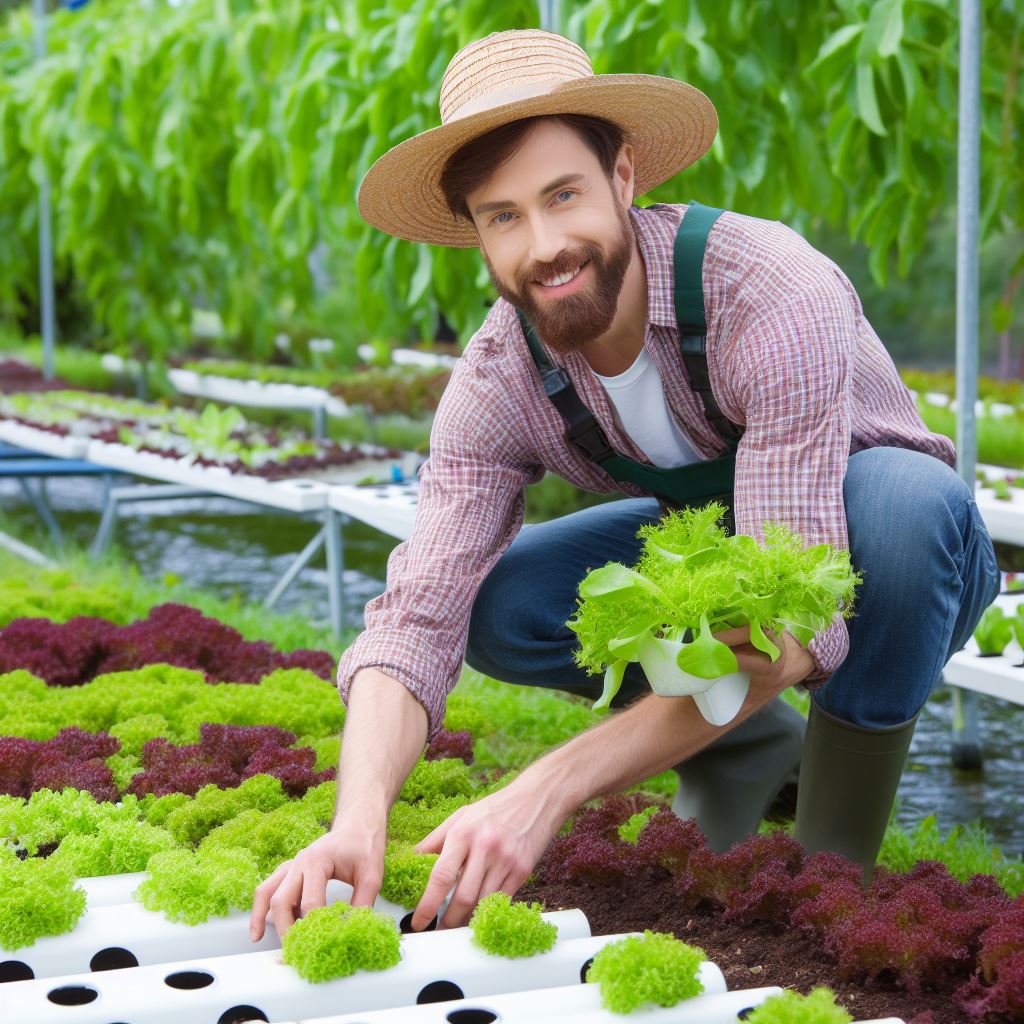Introduction
In today’s rapidly growing urban areas, the importance of urban farming cannot be overstated.
As more and more people move to cities, finding ways to produce food in limited spaces becomes crucial.
That’s where hydroponics comes in. This innovative farming method allows plants to grow without soil, using nutrient-rich water solutions instead.
Hydroponics has gained popularity for several reasons.
Firstly, it requires less land compared to traditional farming methods, making it suitable for urban environments.
Secondly, it uses significantly less water, making it a more sustainable option. Additionally, hydroponics allows for year-round cultivation, eliminating dependence on seasonal changes.
This farming technique utilizes various systems, such as nutrient film technique and ebb and flow.
In the nutrient film technique, a thin film of water flows continuously over the plant roots, providing the necessary nutrients.
On the other hand, in the ebb and flow system, the plants are periodically flooded with nutrient-rich water.
Hydroponics offers unique advantages, such as faster growth and higher yields.
By providing an optimal environment for plant growth, including precise nutrient delivery and controlled temperature, hydroponics maximizes productivity.
It also avoids the challenges of soil-based farming, such as pests, diseases, and soil depletion.
Furthermore, hydroponics allows for vertical farming, making use of vertical space in urban settings.
With the use of stacks or shelves, multiple layers of plants can be grown, significantly increasing productivity in a limited area.
In short, hydroponics is a groundbreaking farming method that has the potential to revolutionize urban agriculture.
Transform Your Agribusiness
Unlock your farm's potential with expert advice tailored to your needs. Get actionable steps that drive real results.
Get StartedWith its efficient use of space, water, and resources, it offers a sustainable solution to the challenges of feeding a growing urban population.
As we look towards the future, hydroponics may indeed be the future of urban farming.
What is hydroponics?
Definition of hydroponics
Hydroponics is a method of growing plants without soil, using a nutrient-rich water solution instead.
Brief history of hydroponics
Hydroponics has been practiced since ancient times, with the first recorded use being in the Hanging Gardens of Babylon around 600 BC.
Advantages of hydroponics over traditional farming methods
- Water efficiency: Hydroponics uses about 90% less water than traditional farming, making it a more sustainable option.
- Space-saving: As hydroponics doesn’t require soil, it can be done vertically or in smaller areas, maximizing land usage in urban settings.
- Nutrient control: With hydroponics, growers can precisely control the nutrients and pH levels, resulting in healthier and more productive plants.
- No pesticides: Hydroponics eliminates the need for pesticides since pests are less likely to infest soil-less systems.
- Year-round production: Hydroponics allows for year-round cultivation regardless of climate, providing a continuous supply of fresh produce.
- Increased yield: Hydroponic systems often have higher yields per area compared to traditional farming methods, resulting in more efficient use of land and resources.
- Reduced environmental impact: Hydroponics reduces soil erosion, nutrient runoff, and water pollution, making it an environmentally friendly option.
- Faster growth: Plants grown hydroponically tend to grow faster due to the optimized nutrient availability, resulting in quicker harvests.
- Enhanced flavor and nutrition: Hydroponically grown plants often have better taste, texture, and nutritional content, appealing to health-conscious consumers.
- Flexibility and scalability: Hydroponics can be implemented on a small scale in home gardens or scaled up to commercial-sized operations, making it adaptable to various needs.
In fact, hydroponics offers numerous advantages over traditional farming methods.
Its water efficiency, space-saving nature, precise nutrient control, and lack of pesticides make it a sustainable and environmentally friendly option.
Additionally, hydroponics provides year-round production, higher yields, faster growth, and enhanced flavor and nutrition.
Its flexibility makes it suitable for both small-scale and large-scale farming operations, making hydroponics the potential future of urban farming.
Read: Pest Control: Natural Solutions for Small Farms
Benefits of hydroponics for urban farming
In this section, we will explore the numerous benefits that hydroponics offers for urban farming.
From efficient use of land space to minimal pesticide use, hydroponics provides a sustainable solution for cultivating crops in urban areas.
Efficient use of land space
Hydroponics allows crops to be grown vertically, maximizing the use of limited urban land space.
Vertical farming systems enable multiple layers of plants to be cultivated, increasing yield per square foot.
By eliminating the need for traditional soil farming methods, hydroponics makes better use of available land, ensuring a higher productivity rate.
Reduction of water consumption
Hydroponics uses up to 90% less water compared to conventional soil-based farming.
The closed-loop system of hydroponics recirculates water, minimizing wastage and conserving a valuable resource.
This water-saving method is particularly crucial in urban areas where water scarcity can be a significant concern.
Year-round cultivation
With hydroponics, urban farmers can grow crops year-round, regardless of seasonal limitations.
Indoor hydroponic systems allow for consistent and controlled environmental conditions, ensuring optimal growth throughout the year.
Longer growing seasons lead to increased crop yields and a more sustainable food production system.
Vertical farming possibilities
Hydroponics creates opportunities for vertical farming, which is particularly advantageous in urban settings with limited space.
Vertical farms can be established in buildings, utilizing unused vertical surfaces to grow crops in stacked layers.
This method maximizes productivity per square foot, offering a feasible solution for urban food production.
Ability to control growing conditions
Hydroponics provides precise control over growing conditions, including lighting, temperature, and nutrient levels.
Showcase Your Farming Business
Publish your professional farming services profile on our blog for a one-time fee of $200 and reach a dedicated audience of farmers and agribusiness owners.
Publish Your ProfileOptimal conditions can be maintained consistently, resulting in healthier plants and higher crop yields.
This level of control minimizes the risk of crop failure due to extreme weather or other environmental factors.
Minimal pesticide use
Hydroponics reduces the need for pesticides, as the controlled environment discourages pests and diseases.
By eliminating soil cultivation and reducing exposure to pests, hydroponic crops require fewer chemical interventions.
This promotes healthier produce and reduces environmental pollution associated with pesticide use.
In essence, hydroponics offers several significant benefits for urban farming.
By efficiently utilizing land space, conserving water, enabling year-round cultivation, and providing control over growing conditions, hydroponics proves to be a sustainable solution for urban food production.
Furthermore, the minimal use of pesticides protects both the environment and consumer health.
With its ability to revolutionize urban farming, hydroponics indeed holds the potential to be the future of sustainable agriculture.
Read: Top 10 Plants for Beginner Urban Gardeners
Successful examples of hydroponic urban farming
Case study 1: Brooklyn Grange in New York
Description of the project
In the heart of New York City, Brooklyn Grange operates the world’s largest rooftop soil farm.
They use hydroponic systems to cultivate a wide range of vegetables and herbs without soil.
The farm spans over two rooftops, totaling 2.5 acres, and produces over 50,000 pounds of produce annually.
Achievements and recognition
Brooklyn Grange has become a model for sustainable urban farming.
Their innovative approach has not only allowed for the production of fresh, local food but also helps reduce the city’s carbon footprint.
They have received numerous accolades, including being named one of the 30 most exciting new businesses in America by Inc. Magazine.
Case study 2: Growing Underground in London
Description of the project
Located deep below the streets of London, Growing Underground is an urban farm housed in an abandoned World War II air-raid shelter.
Using hydroponic technology, they grow a variety of crops, including microgreens, salad leaves, and herbs.
The farm utilizes energy-efficient LED lights and a closed-loop water system to minimize resource consumption.
Achievements and recognition
Growing Underground has gained international acclaim for their innovative farming methods.
They have been featured in major media outlets and have received prestigious awards for their sustainable practices.
The farm’s commitment to reducing food miles and food waste has made it a pioneer in urban agriculture.
The success of Brooklyn Grange and Growing Underground showcases the immense potential of hydroponic urban farming.
These case studies demonstrate that it is possible to grow large quantities of fresh produce in urban environments, mitigating the challenges presented by limited space and soil quality.
They provide inspiration for aspiring urban farmers and highlight the importance of sustainable agriculture in tackling food insecurity and environmental issues.
Read: Small-Scale Farming: Maximizing Your Space

Challenges and limitations of hydroponics in urban farming
Initial setup costs
- Hydroponics systems require high upfront investment for equipment and infrastructure.
- Setting up grow lights, nutrient delivery systems, and temperature controls can be expensive.
- Costs may discourage small-scale farmers or individuals from adopting hydroponics in urban areas.
Technical expertise and maintenance
- Hydroponics requires advanced knowledge and skills to set up and maintain the system.
- Farmers need to understand pH levels, nutrient formulas, and pest control methods specific to hydroponics.
- Monitoring water quality, temperature, and humidity is crucial for plant health and productivity.
- Maintenance tasks such as regular cleaning, sterilization, and nutrient solution replenishment are time-consuming.
Power dependency
- Hydroponics relies heavily on electricity to power grow lights and maintain optimal environmental conditions.
- Energy costs can be significant, especially for large-scale hydroponic farms in urban areas.
- Power outages or fluctuations may interrupt lighting schedules and affect plant growth.
Lack of awareness and acceptance
- Many people are still unfamiliar with hydroponics and its benefits for urban farming.
- The concept of soilless agriculture is often met with skepticism or resistance.
- Educational programs and public awareness campaigns are needed to promote hydroponics as a viable solution.
- Cultural and societal beliefs may need to change to embrace hydroponics as a sustainable urban farming method.
Read: Urban Farming 101: Starting Your City Garden
Future prospects of hydroponics in urban farming
Increasing interest and investment
- The growing interest in urban farming has paved the way for the expansion of hydroponics.
- Government and private sectors are investing heavily in hydroponic systems and infrastructure.
- The increasing funding for research and development in hydroponics indicates a promising future.
Emerging technologies and innovations in hydroponics
- Advancements in technology have led to the development of more efficient hydroponic systems.
- Automated monitoring and control systems allow precise regulation of nutrient supply and environmental conditions.
- Cutting-edge innovations such as vertical farming and aquaponics integrate hydroponics for enhanced productivity.
Potential to create sustainable food systems in cities
- Hydroponics offers a solution to the challenges of limited land availability in urban areas.
- By utilizing vertical spaces and rooftops, hydroponic farms can produce a significant amount of food.
- The controlled environment of hydroponic systems minimizes water usage and eliminates the need for chemical pesticides.
- Shorter growing cycles and higher yields in hydroponics contribute to more sustainable food production.
In a nutshell, hydroponics holds great promise as the future of urban farming.
With increasing interest and investment, it is likely to become a mainstream method of food production.
Emerging technologies and innovations in hydroponics further enhance its efficiency and productivity.
Moreover, the potential of creating sustainable food systems in cities through hydroponics is immense.
As urban populations continue to grow, hydroponics can provide a viable solution to feed the masses in a sustainable and environmentally friendly manner.
See Related Content: Homemade Remedies for Plant Diseases
Conclusion
Hydroponics offers numerous benefits such as higher yields, efficient water usage, and year-round cultivation.
However, it also presents challenges such as initial costs and technical expertise requirements.
Considering the growing demand for food in urban areas and the limitations of traditional farming methods, hydroponics undoubtedly holds immense potential as a solution for urban farming.
Its ability to maximize productivity in limited spaces makes it an attractive choice.
The potential of hydroponics is yet to be fully explored and utilized.
By investing in research, development, and education, we can overcome the challenges and unlock the full potential of hydroponics.
Governments, communities, and individuals should embrace this innovative farming technique and work towards its widespread adoption.
Showcase Your Farming Business
Publish your professional farming services profile on our blog for a one-time fee of $200 and reach a dedicated audience of farmers and agribusiness owners.
Publish Your ProfileTogether, we can create a sustainable and efficient future for urban farming.




